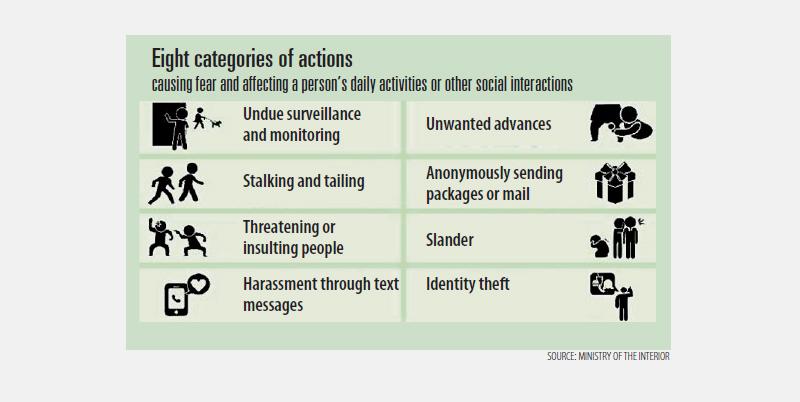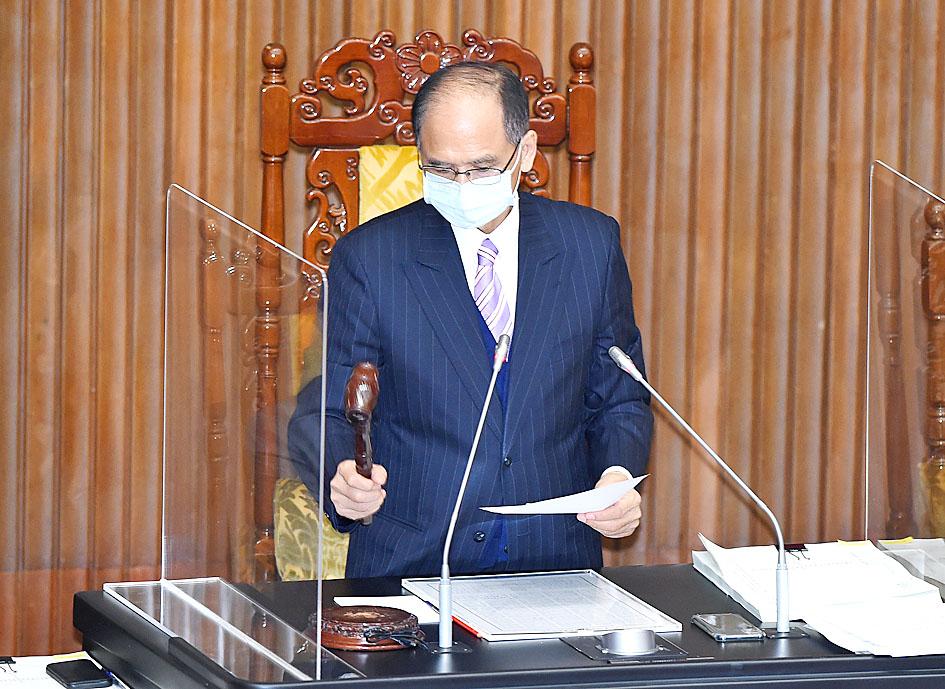The Legislative Yuan yesterday passed the Stalking and Harassment Prevention Act (跟蹤騷擾防制法), which makes stalking a crime that is punishable by up to five years in prison.
The bill focuses on eight major kinds of stalking and harassment behaviors that repeatedly target a victim against their will: surveillance and monitoring, stalking and tailing, threatening and insulting, harassment through electronic communications, unwanted advances, anonymously sending mail, slander, and identity theft.
After the police receive reports of such behavior, they can initiate an investigation, arrest suspects and advise a court to detain them, the Ministry of the Interior said in a news release.

Police can issue written warnings and if they find that a suspect has committed the crime again, they can ask a court to issue a protective order for the victim, it said.
The court can detain suspects as a preventive measure if they are found in possession of weapons or dangerous items, or are considered likely to commit the same crime again, it said.
Offenders would face a jail term of less than one year or a fine of NT$100,000. If they are found in possession of a weapon or other dangerous items, their penalty can be increased to five years in jail or a fine of up to NT$500,000, it said.

Photo: Liao Chen-huei, Taipei Times
Those who contravene a court-issued protective order for a victim would face a prison term of up to three years or a fine of NT$300,000, it added.
The law is to be implemented six months after it is promulgated, the ministry said.
Minister of the Interior Hsu Kuo-yung (徐國勇) in the statement thanked lawmakers, as well as civic groups, for their efforts in pushing for the bill’s passage over the past six years.
The bill makes stalking and harassment crimes, as in many other countries, the ministry said.
To hasten the implementation of the act, the ministry would soon complete training for police officers nationwide, as well as set up regulations related to the bill, it said.
The ministry would also present assessment reports on the act’s efficiency three years after it is implemented to keep improving social safety, it said.

INVESTIGATION: The case is the latest instance of a DPP figure being implicated in an espionage network accused of allegedly leaking information to Chinese intelligence Democratic Progressive Party (DPP) member Ho Jen-chieh (何仁傑) was detained and held incommunicado yesterday on suspicion of spying for China during his tenure as assistant to then-minister of foreign affairs Joseph Wu (吳釗燮). The Taipei District Prosecutors’ Office said Ho was implicated during its investigation into alleged spying activities by former Presidential Office consultant Wu Shang-yu (吳尚雨). Prosecutors said there is reason to believe Ho breached the National Security Act (國家安全法) by leaking classified Ministry of Foreign Affairs information to Chinese intelligence. Following interrogation, prosecutors petitioned the Taipei District Court to detain Ho, citing concerns over potential collusion or tampering of evidence. The

TRADE: The premier pledged safeguards on ‘Made in Taiwan’ labeling, anti-dumping measures and stricter export controls to strengthen its position in trade talks Products labeled “made in Taiwan” must be genuinely made in Taiwan, Premier Cho Jung-tai (卓榮泰) said yesterday, vowing to enforce strict safeguards against “origin laundering” and initiate anti-dumping investigations to prevent China dumping its products in Taiwan. Cho made the remarks in a discussion session with representatives from industries in Kaohsiung. In response to the US government’s recent announcement of “reciprocal” tariffs on its trading partners, President William Lai (賴清德) and Cho last week began a series of consultations with industry leaders nationwide to gather feedback and address concerns. Taiwanese and US officials held a videoconference on Friday evening to discuss the

NEGOTIATIONS: The US response to the countermeasures and plans Taiwan presented has been positive, including boosting procurement and investment, the president said Taiwan is included in the first group for trade negotiations with the US, President William Lai (賴清德) said yesterday, as he seeks to shield Taiwanese exporters from a 32 percent tariff. In Washington, US Trade Representative Jamieson Greer said in an interview on Fox News on Thursday that he would speak to his Taiwanese and Israeli counterparts yesterday about tariffs after holding a long discussion with the Vietnamese earlier. US President Donald Trump on Wednesday postponed punishing levies on multiple trade partners, including Taiwan, for three months after trillions of US dollars were wiped off global markets. He has maintained a 10 percent

PERSONAL DATA: The implicated KMT members allegedly compiled their petitions by copying names from party lists without the consent of the people concerned Judicial authorities searched six locations yesterday and questioned six people, including one elderly Chinese Nationalist Party (KMT) member and five KMT Youth League associates, about alleged signature forgery and fraud relating to their recall efforts against two Democratic Progressive Party (DPP) legislators. After launching a probe into alleged signature forgery and related fraud in the KMT’s recall effort, prosecutors received a number of complaints, including about one petition that had 1,748 signatures of voters whose family members said they had already passed away, and also voters who said they did not approve the use of their name, Taipei Deputy Chief Prosecutor